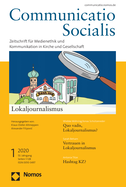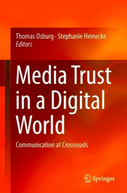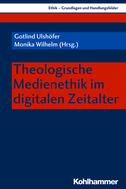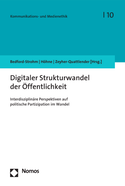|
Jonas Bedford-Strohm: Demythologizing Artificial Intelligence - Reflections on the Role and Purpose of Complex Data Processing in Digital Media Transformation, in Frederike van Oorshot, Seline Fucker (eds.), Framing KI: Narrative, Metaphern und Frames in Debatten über Künstliche Intelligenz.
Published by heiBOOKS (FEST Forschung vol. 2), 2022, p. 55-80. Available open access here. |
|
Claudia Paganini (2020): Rezension von Jonas Bedford-Strohm, Florian Höhne, Julian Zeyher-Quattlender (Hrsg.): Digitaler Strukturwandel der Öffentlichkeit. Interdisziplinäre Perspektiven auf politische Partizipation im Wandel
Communicatio Socialis, Seite 115 - 117, Jahrgang 53 (2020), Heft 1, ISSN print: 0010-3497, ISSN online: 0010-3497, https://doi.org/10.5771/0010-3497-2020-1-115 |
|
Jonas Bedford-Strohm: Socio-historical Contexts of Anti-institutionalist Tendencies in Digital Media Transformation, in: Thomas Osburg, Stephanie Heinecke (Hrsg.), Media Trust in a Digital World. Communication at Crossroads.
Veröffentlicht im Springer-Verlag, 1. Auflage 2019, 262 Seiten, ISBN 978-3-030-30773-8, Zu Kaufen im Springer-Shop hier. Volltext frei verfügbar hier. |
Summary
This book examines the shifting role of media trust in a digital world, and critically analyzes how news and stories are created, distributed and consumed. Emphasis is placed on the current challenges and possible solutions to regain trust and restore credibility. The book reveals the role of trust in communication, in society and in media, and subsequently addresses media at the crossroads, as evinced by phenomena like gatekeepers, echo chambers and fake news. The following chapters explore truth and trust in journalism, the role of algorithms and robots in media, and the relation between social media and individual trust. The book then presents case studies highlighting how media creates trust in the contexts of: brands and businesses, politics and non-governmental organizations, science and education. In closing, it discusses the road ahead, with a focus on users, writers, platforms and communication in general, and on media competency, skills and education in particular.
|
Jonas Bedford-Strohm, Alexander Filipovic: Mediengesellschaft im Wandel – Theorien, Themen, Ethische Herausforderungen, in: Gotlind Ulshöfer, Monika Wilhelm (Hrsg.), Theologische Medienethik Im Digitalen Zeitalter, Stuttgart, 2019, 47–63.
Veröffentlicht im Kohlhammer-Verlag in der Reihe Ethik - Grundlagen und Handlungsfelder, Bd. 14, 396 Seiten, ISBN-10: 3170344536- Zu Kaufen im Kohlhammer-Shop hier. |
Zusammenfassung
Medien sind ubiquitär geworden, was vor allen Dingen an den technischen Möglichkeiten liegt, die Smartphones und andere mobile Kommunikationsgeräte mit sich bringen. Mediale Kommunikation wird nicht mehr allein von großen Sendeanstalten initiiert, sondern jede*r kann mit Social Media öffentlich kommunizieren. Darüber hinaus kann Kommunikation - wie sich bei social bots beispielsweise zeigt - auch maschinell erstellt werden. Diese zahlreichen Veränderungen im Bereich der Medien und Kommunikation führen zu ethischen Fragen, die weit über die traditionellen Themen der Medienethik, wie beispielsweise journalistische Ethik, hinausweisen und stellen Gesellschaft und Institutionen wie Kirche vor neue moralische und rechtliche Herausforderungen. In dem Band werden diese Entwicklungen unter theologisch-medienethischen Perspektiven analysiert und diskutiert.
|
Jonas Bedford-Strohm: Mythologie, Typologie, Pathologie: Bausteine einer kritischen Theorie der Datenverarbeitung & Jonas Bedford-Strohm: Digitalisierung, Kampagnisierung, Mediatisierung: Die digitale Transformation der institutionellen Kommunikation am Beispiel der vernetzten Kirche.
Veröffentlicht in: Björn Görder/Julian Zeyher-Quattlender (Hrsg.), Daten als Rohstoff. Die Nutzung von Daten in Wirtschaft, Diakonie und Kirche aus ethischer Perspektive, LIT-Verlag, Reihe Theologie und Ökonomie, Bd. 40, 2019, 272 S., ISBN 978-3-643-14093-7. Zu Kaufen im LIT-Shop hier. |
Zusammenfassung
Daten bilden den "Rohstoff" der Digitalisierung. Ihre umfassende Erhebung, Verknüpfung und Auswertung sind grundlegend für alle Digitalisierungsprozesse. In nahezu allen Bereichen der Gesellschaft verbinden sich mit der Nutzung von Daten Potenziale und Chancen, aber auch Risiken und Gefahren. Der vorliegende Band geht diesem Phänomen in ethischer, erkenntnistheoretischer und anthropologischer Hinsicht nach und versammelt dabei Perspektiven aus unterschiedlichen Wissenschaften und Praxisfeldern. Einen Schwerpunkt bilden theologische Zugänge und die Frage nach dem Umgang mit Daten in Wirtschaft, Diakonie und Kirche.
|
Digitaler Strukturwandel der Öffentlichkeit - Interdisziplinäre Perspektiven auf politische Partizipation im Wandel, hrsg. von Jonas Bedford-Strohm, Florian Höhne und Julian Zeyher-Quattlender.
Veröffentlicht bei Nomos in der Reihe Kommunikations- und Medienethik, Bd. 10 (hrsg. von Alexander Filipovic, Christian Schicha, Ingrid Stapf), 1. Auflage 2019, ISBN print: 978-3-8487-4968-3, ISBN online: 978-3-8452-9180-2, https://doi.org/10.5771/9783845291802. Zu kaufen gibt's den Band im Nomos-Shop hier und zu lesen in der Nomos eLibrary hier. Viel Spaß! |
Zusammenfassung
Breit diskutierte Phänomene wie „Filterblasen“ und „Social Bots“ zeigen auf, dass die digitale Transformation auch die öffentliche Kommunikation erfasst hat. Neue Informations- und Partizipationsmöglichkeiten entstehen und Wege der Meinungsbildung verändern sich. Die Beiträge des Bandes untersuchen diesen Wandel in ethischer Perspektive und bringen dabei theologische, medienethische und politikwissenschaftliche Theorie ins Gespräch mit digitaler Praxis. Dabei wird gezeigt, welche Konzepte und Funktionen von „Öffentlichkeit“ unter den Bedingungen der digitalen Gesellschaft tragfähige Orientierung für die Praxis geben können. Gefahren des digitalen Wandels für die Demokratie werden genauso differenziert erläutert, wie die Chancen, etwa für zivilgesellschaftliche Partizipation und Bottom-Up-Prozesse. Über die die institutionelle Politik hinaus, befasst sich der Band mit der digitalen Transformation des Politischen und den Konsequenzen für kirchliche Arbeit, Protestbewegungen und Medienangebote.
Damit sind die Texte nicht nur interessant für Fachwissenschaftler*innen, die sich mit dem digitalen Wandel auseinandersetzen, sondern auch für Journalist*innen, Politiker*innen und Mitarbeiter*innen in Nichtregierungsorganisationen und der Kirche. Mit Beiträgen von Sigrid Baringhorst, Christina Schachtner, Florian Stickel, Julian Zeyher-Quattlender, Gary Schaal, Ilona Nord, Christoph Bieber, Jonas Bedford-Strohm, Alexander Filipovic, Alexander Görlach, Torsten Meireis, Frederike van Oorschot, Thomas Renkert.
Summary
Widely discussed phenomena like ‘filter bubbles’ and ‘social bots’ point to the reality that the digital transformations of the present also encompass public communication. New opportunities for information and participation have arisen and opinion formation is changing. This volume explores these transformations from an ethical perspective and discusses theoretical work in theology, media ethics and political science in combination with digital practice. It evaluates the potential knowledge arising from various concepts and functions in the ‘public sphere’ under the conditions of digital societies, and discusses in a nuanced way both the dangers to democracy and the opportunities for civic participation and bottom-up processes as a result of digital transformation. Venturing beyond institutional politics, this volume explores the digital transformation of the political and its consequences for churches, protest movements and media outlets.
Hence, the contributions it contains are not only relevant for academics working on digital transformation, but also journalists,
politicians and employees at NGOs and in churches. With contributions by Sigrid Baringhorst, Christina Schachtner, Florian Stickel, Julian Zeyher-Quattlender, Gary Schaal, Ilona Nord, Christoph Bieber, Jonas Bedford-Strohm, Alexander Filipovic, Alexander Görlach, Torsten Meireis, Frederike van Oorschot, Thomas Renkert.
Zusammenfassung
Breit diskutierte Phänomene wie „Filterblasen“ und „Social Bots“ zeigen auf, dass die digitale Transformation auch die öffentliche Kommunikation erfasst hat. Neue Informations- und Partizipationsmöglichkeiten entstehen und Wege der Meinungsbildung verändern sich. Die Beiträge des Bandes untersuchen diesen Wandel in ethischer Perspektive und bringen dabei theologische, medienethische und politikwissenschaftliche Theorie ins Gespräch mit digitaler Praxis. Dabei wird gezeigt, welche Konzepte und Funktionen von „Öffentlichkeit“ unter den Bedingungen der digitalen Gesellschaft tragfähige Orientierung für die Praxis geben können. Gefahren des digitalen Wandels für die Demokratie werden genauso differenziert erläutert, wie die Chancen, etwa für zivilgesellschaftliche Partizipation und Bottom-Up-Prozesse. Über die die institutionelle Politik hinaus, befasst sich der Band mit der digitalen Transformation des Politischen und den Konsequenzen für kirchliche Arbeit, Protestbewegungen und Medienangebote.
Damit sind die Texte nicht nur interessant für Fachwissenschaftler*innen, die sich mit dem digitalen Wandel auseinandersetzen, sondern auch für Journalist*innen, Politiker*innen und Mitarbeiter*innen in Nichtregierungsorganisationen und der Kirche. Mit Beiträgen von Sigrid Baringhorst, Christina Schachtner, Florian Stickel, Julian Zeyher-Quattlender, Gary Schaal, Ilona Nord, Christoph Bieber, Jonas Bedford-Strohm, Alexander Filipovic, Alexander Görlach, Torsten Meireis, Frederike van Oorschot, Thomas Renkert.
Summary
Widely discussed phenomena like ‘filter bubbles’ and ‘social bots’ point to the reality that the digital transformations of the present also encompass public communication. New opportunities for information and participation have arisen and opinion formation is changing. This volume explores these transformations from an ethical perspective and discusses theoretical work in theology, media ethics and political science in combination with digital practice. It evaluates the potential knowledge arising from various concepts and functions in the ‘public sphere’ under the conditions of digital societies, and discusses in a nuanced way both the dangers to democracy and the opportunities for civic participation and bottom-up processes as a result of digital transformation. Venturing beyond institutional politics, this volume explores the digital transformation of the political and its consequences for churches, protest movements and media outlets.
Hence, the contributions it contains are not only relevant for academics working on digital transformation, but also journalists,
politicians and employees at NGOs and in churches. With contributions by Sigrid Baringhorst, Christina Schachtner, Florian Stickel, Julian Zeyher-Quattlender, Gary Schaal, Ilona Nord, Christoph Bieber, Jonas Bedford-Strohm, Alexander Filipovic, Alexander Görlach, Torsten Meireis, Frederike van Oorschot, Thomas Renkert.
|
Bedford-Strohm, Jonas (2018): Rezension von Steffen Burk, Martin Hennig, Benjamin Heurich, Tatiana Klepikova, Miriam Piegsa, Manuela Sixt, Kai Erik Trost (Hrsg.): Privatheit in der digitalen Gesellschaft.
Communicatio Socialis, Seite 374 - 375, Jahrgang 51 (2018), Heft 3, ISSN print: 0010-3497, ISSN online: 0010-3497, DOI: 10.5771/0010-3497-2018-3-374 |
|
Bedford-Strohm, Jonas (2017): Beyond the Bubble. The Digital Transformation of the Public Sphere and the Future of Public Institutions.
Hrsg.: Altmeppen, Klaus-Dieter; Filipovic, Alexander, zem::dg-papers 1, Eichstätt/München 2017, ISBN 978-3-947443-01-7. DOI: 10.17904/ku.edoc.21157. Open Access Download der Katholischen Universität Eichstätt: Link. |
Zusammenfassung
Die Digitalisierung verändert die Art und Weise, wie wir kommunizieren, und hat dadurch auch weitreichende Implikationen für die Art und Weise, wie wir an dem Raum teilnehmen, den wir “öffentlich” nennen. Die vorliegende Studie untersucht den digitalen Strukturwandel der Öffentlichkeit und analysiert drei entwicklungstreibende Trends — Netzwerkarchitekturen, personalisierte Individualität und automatisierte Arbeitsabläufe. Abstrakte, monolithische Konzeptionen der einen kohärenten Öffentlichkeit sind überholt, weil technologische Veränderungen wie die Verbreitung sozialer Medien, die moderne Wertschätzung des Individualismus, menschliche Tendenzen zum Confirmation Bias, sowie das postkoloniale Interesse an kontextueller Erfahrung, ein diverses Spektrum an gefilterten Teilöffentlichkeiten hervorgebracht haben, die für sich allein genommen jeweils nicht die Kriterien erfüllen, die mit dem Konzept der Öffentlichkeit bisher assoziiert wurden. Sollten wir den Begriff überhaupt noch benutzen?
Abstract
Filter bubbles, echo chambers, information cocoons: The digital revolution has changed the way we communicate with profound implications for how we participate in the space we call “the public.” Digital trends toward network architectures, personalized individuality and automated workflows are driving a transformation of the public with significant impact on the institutions making up this public sphere. What, then, is this “public” sphere today? Abstract, monolithic conceptions of the one coherent public appear outdated, since technological changes like the rise of social media, as well as the modern appreciation of individualism, human tendencies towards a confirmation bias, and the postcolonial focus on contextual experience have created or reinforced a diverse spectrum of filtered publics that do not fulfill the criteria associated with the public sphere. Can we even continue to use the term?
|
Bedford-Strohm, Jonas (2017): Voice First? Eine Analyse des Potentials von intelligenten Sprachassistenten am Beispiel Amazon Alexa.
ComSoc, Jahrgang 50 (2017), Heft 4, Seite 485 - 494. ISSN print: 0010-3497, ISSN online: 0010-3497, DOI: 10.5771/0010-3497-2017-4-485. Volltext verfügbar hier. |
Zusammenfassung
Mit dem Markteintritt von digitalen Sprachassistenten wie Amazon Alexa und Google Home kommt der Sprache eine neue Bedeutung in der alltäglichen Interaktion von Mensch und Maschine zu. Das Paradigma des Zero-User-Interface ist dabei leitend: Nutzer_ innen brauchen keine Nutzerschnittstelle wie einen Touchscreen zu bedienen. Das verändert Medien- und Kommunikationspraxis, aber auch Geschäfts- und Distributionsmodelle von Tech-Unternehmen und Medienhäusern. Am Beispiel von Amazon Alexa analysiert der Artikel die Funktionsweise und Profiteure der neuen Sprachassistenten, diskutiert ihren Einfluss auf die alltägliche Lebenspraxis und zeigt die Unzulänglichkeit der Verwendung des Begriffs der Künstlichen Intelligenz für die Sprachdienste der digitalen Assistenten auf.
Abstract
In the wake of the German market launch of digital voice assistants like Amazon Alexa and Google Home, the broad topic of speech assistance has acquired novel significance in the day-to-day interaction of humans and machines. The paradigm of zero user interface design guides this effort: users no longer need an interface like a touch screen to navigate their device. This changes media and communication practice, but also impacts business and distribution models of tech companies and the media. Using Amazon Alexa as the analytical lens, the article examines how voice assistants work and who profits from them. It discusses their influence on daily life and shows how inadequate the use of the concept of artificial intelligence is for the voice services of digital assistants.
|
Jonas Bedford-Strohm, Andrew Doss, Leanne Erdberg Steadman: Rheomesa. A New Global System for Catastrophe Prevention, Response & Recovery
Abstract: "This paper identifies three structural vacuums in catastrophe governance today that allow for the greatest risks humanity faces to be externalized from decision-making. To mitigate the impact of these risks, The Rheomesa (“fluid table”) provides (1) a deliberative decision-making process between currently siloed entities in various sectors managing the outcome of catastrophes, including government, the private sector, NGOs, IGOs, and hybrid entities, with (2) a prospective, long-term accountability and incentive mechanism that (3) comprehensively addresses the three interdependent tasks societies face surrounding catastrophes – prevention, response, recovery." Veröffentlicht am 27. Januar 2020 auf SSRN unter diesem Link. |











